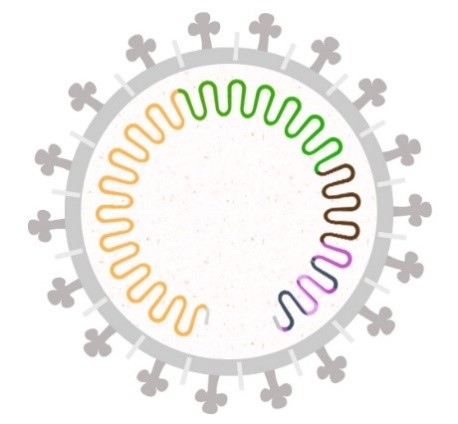Covid variants enter the U.S.

Photo courtesy of cdc.gov
The virus genome is packed inside an envelope that contains proteins, including the Spike protein.
Since COVID-19 was identified over a year ago, thousands of mutations have emerged. According to bbc.com, Dr. Lucy van Dorp, an expert on pathogens at University College London, describes the majority of mutations as “passengers” that will have little impact. “They don’t change the behavior of the virus, they are just carried along.”
However, a virus can mutate in a way that helps it survive and reproduce. “Viruses carrying these mutations can then increase in frequency due to natural selection,” Dorp said.
This seems to be happening with variants spreading throughout several countries. As COVID-19 vaccines are being administered, there is added concern due to three covid variants that have spread to the United States. The variants are from the United Kingdom, South Africa and Brazil.
The variant from the United Kingdom is called B.1.1.7. According to cdc.gov, compared to other variants, this one spreads more quickly and easily. Scientists from the U.K. reported evidence that suggests that this variant may have an increased risk of death, however, more studies are necessary to confirm this statement.
The U.K. variant has made its way to the University of Michigan causing sports to shut down for two weeks. University of Michigan student and WHS alum Jared Greenspan said the administration has responded to the variants “pretty swiftly and strictly.”
Greenspan explained that an athlete from the U.K. brought the variant back to campus and then there were about five cases on multiple teams. “It’s unclear what’s going to happen when sports return. The sports programs and COVID-19 precautions were already really strict, so I can’t see any more restrictions occurring, but maybe more vigilance,” Greenspan said.
University of Michigan campus, college and health officials implemented a shelter in place for all students, which happened several times in the fall as well Greenspan noted.
Additionally, the variant from Brazil is known as P.1. According to npr.com, this variant is most concerning to scientists due to changes in the virus’s spike (S) protein. This protein gives the virus access and entry into human cells, leading some scientists to question the effectiveness of the currently authorized vaccines against this specific variant.
The variant from South Africa is called B.1.351. According to nytimes.com, the Pfizer and Moderna vaccines appear slightly less effective against this variant, however, booster shots are being developed to protect against this variant.
While these variants are spreading quickly, there are still some unknowns about them. Scientists are studying and experimenting to learn more about the variants. COVID-19 precautions are still necessary, especially with the spread of these variants, in order to protect the public.
